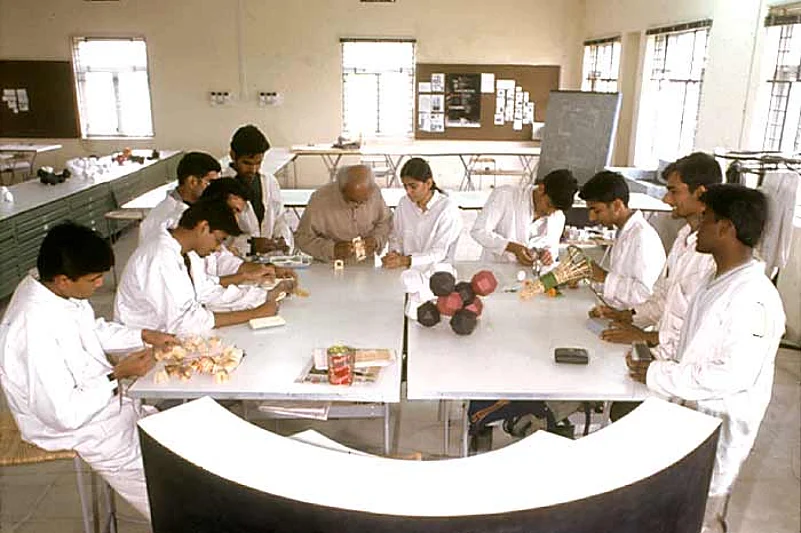I have a secret to tell you: when I was at school I was a bit of a truant. It’s not that I wandered off to watch movies or smoke behind the bike sheds, it’s just that after a while I reached a point in some subjects where I was learning faster by myself than I was in the classroom. So occasionally I’d take a day or two off and work from home. The habit became more frequent. Until, by the end, my mathematics teacher noticed that I was more often away from class than in it. The thing is, even though I didn’t win any prizes for good attendance, I topped my year.
My tale might seem to add weight to Jairam Ramesh’s observation that good, hardworking students are good, hardworking students no matter what environment they’re in. It’s become a common notion that as long as good students have enough of the right books, then clever teachers and fancy classrooms are little more than a comfortable bonus. But is this really true, especially in the intellectually demanding world of higher education?
It was a question I had in my mind while writing Geek Nation: How Indian Science is Taking Over the World. During research for the book, I spent a week at the Indian Institute of Technology in Delhi. The dean confirmed that, however tight budgets get, they never skimp on books. The library is so well-stocked that not a single person has a bad word to say about it. But many of the lecture theatres have peeling old walls and creaking wooden benches. Dust encrusts the windows. The student body has been lobbying for air-conditioning to spare them from the searing summer heat, and been repeatedly refused. Some parts of the campus, one student told me, are “filthy”. And yet, despite their surroundings, many of the graduates are brilliant.
It’s a strange conundrum. From the outside, it certainly seems that these students are succeeding despite the system, that you could throw them in a bare room with their books for three years and they would come out just as well-educated. They are, after all, the cream of the crop to begin with.
But that would be to ignore how higher education really works. Let me recount another story from my childhood: When I was about 16, my physics teacher gave us a problem, which, having sneakily skipped a few classes to study something else, I found I could not answer. So at home one night I pulled out an undergraduate physics textbook from my dad’s bookshelf. It was pitched at a grade far beyond my young brain, but I persevered, and attempted a solution. It turned out to be wrong, but when my physics teacher saw my novel approach, he guided me to the books that would help me get it right the next time. That’s what good teachers do. For the good, hardworking students, they’re not so much there to hold their hands as to guide from a distance. And in higher education, that’s truer than anywhere else.
We don’t always realise how essential that guidance is. Although I like to believe that I have a natural passion for what I do for a living, the truth is that my English teacher was the one who truly inspired me to write and encouraged me to believe I was good at it. The lab assistants at my university were the people who instilled in me a love of tinkering with technology, beyond the facts and figures. And my tutors subtly pushed me to the furthest reaches of my mental ability. They weren’t just drilling me with information, they were showing me avenues to explore that I probably would never have found by myself.
Whatever complaints get thrown at the faculties of India’s big engineering and science colleges, my experience was that the teachers there are doing exactly the same. At IIT Delhi, for example, I spent some time sitting in a lecture by Prof. Ambuj Sagar about the growth of technology through history. He spent a fascinating hour, not listing facts for the students about what happened at which date, but encouraging them to question how science policy evolved and why. He is a talented, committed lecturer. And yet, the students seemed resistant to engage with his ideas. Question after question, they sat there in stony silence. It’s not an easy job to persuade people to innovate and think differently about the world, and that’s why so few teachers and lecturers manage to achieve these inspirational heights.
But as Sagar’s lecture proved, there are also many thousands of students out there who simply don’t want to explore around their subjects and engage more creatively with science and engineering. I’m certain that every IIT has its fair share of undergraduates who just want to get the grades, get out and get a well-paid job. It’s why so many Indian IT professionals are accused of being drone-like, no good for anything except dull outsourcing work. While the poor quality of teaching staff in the smaller colleges and weaker universities across India is a problem that desperately needs to be fixed, people also need to recognise that sometimes the weaknesses may in fact lie in the students themselves.
Teaching young people is a social activity. It involves us all, from parents and teachers to bookshops and the media. In this mix, it’s easy to ignore the contribution of the good, quiet teachers, modestly plugging away and trying to improve the minds in their care. The fact is, while it’s probably true that a successful engineering college might be able to survive without air-conditioning, it would never be able to thrive without a good faculty.
And as a former engineering student, I can attest that good, quiet teachers are also the last to be thanked. I have often come across successful people who claim that their achievements are theirs alone. But dig a bit deeper into their stories and you will often find that there was usually someone there in the background, to inspire and guide them. Sometimes it will be a parent. But very often you will find that person turns out to be a tutor, a lecturer or a teacher. If we want more of these wonderful guides, the ones who open up the world to us and inspire us to achieve our dreams—not just drill and cram us with facts—then they should be valued and celebrated.
(Angela Saini is the author of the bestselling book, Geek Nation, and has a Masters in Engineering from Oxford University.)


























